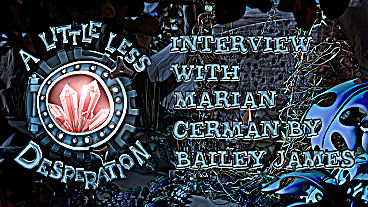
Interview with Marian Cerman, the Driving Force Behind A Little Less Desperation
After hearing Marian’s take on the game, I want to play it more than ever!
Have you ever played a wacky space adventure starring an Amish vegetable farmer? Yeah, we didn’t think so. That’s what Marian Cerman is banking on with the upcoming title A Little Less Desperation, which is finishing up its Kickstarter campaign in just a few days (check out the campaign here — you can still donate!) Following in the footsteps of classic point-and-click adventures, A Little Less Desperation hopes to bring back the feeling of a funny, challenging game that forces lateral thinking from the player. You can check out our preview of the game here.
We got a chance to ask Marian, who proudly calls himself the Founder of Deaf Bird Entertainment and Chief Vegetable Peeler, some questions about the game and its development. He’s responsible for the story and puzzles, background images and animations, character design, dialogue and sound design. After hearing his take, we can’t wait to try out A Little Less Desperation!
JA: Congratulations on reaching your Kickstarter goal! What made you decide to crowdfund your game and what was the process of creating the campaign like?
MC: Thank you very much! We’re quite surprised by that! There are two important reasons for the crowdfunding campaign. The first one is obviously the money that is required to create a game. We have already spent quite a bit on hardware, software and licenses when we started with the development process about three years ago. Plus, for our trailers and the demo, we had to hire some voice actors. And this will represent the largest part of the costs for the final game, since the game will be published in at least two languages, English and German.
The other important reason was to get some attention, that’s incredibly hard these days. [sic] Especially, when you are a tiny developer nobody has heard of before. We read that several hundred games get published every day, so it’s hardly surprising. We have sent hundreds of mails and forum posts the past three years and we got no attention at all at the beginning. Finally some adventure related websites started to post articles about our project, but still we didn’t feel we’d reached a wide audience. So we thought, even if we don’t reach our funding goal, the campaign might attract some attention.
Creating the campaign was a lot more work than we initially expected it to be. We created our game trailer with some in-game footage, cutscenes and specially-created bits for that purpose and it took us quite long. [sic] The next step was creating some informative and punchy texts for it and translating it in German and English. We were quite surprised by the amount of work required to make up the rewards. We took a look at a few other campaigns before and we were impressed by how simple and smooth they looked. While creating our campaign we learned that making it look smooth is not simple at all; on the contrary! We came up with the silly plunger theme for the campaign rather by accident, but it seemed to have worked nicely, something to look and laugh at. [sic] All together [sic] we expected the campaign to take a few days to set up, but we ended up working on it for several months.
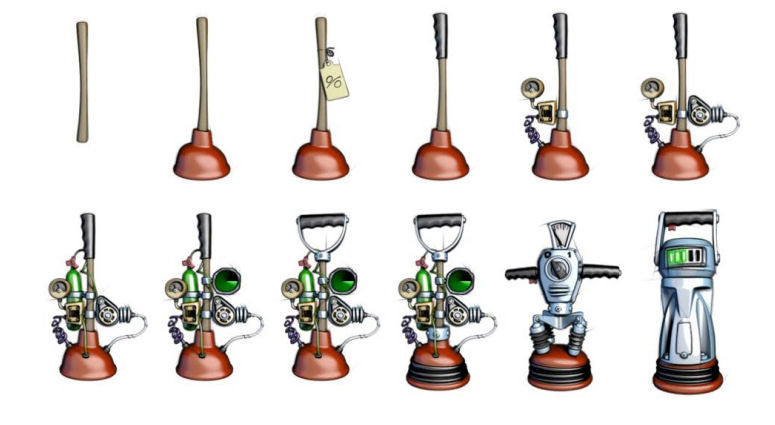
JA: Jacob is an unlikely hero in an intergalactic story like this. How did you decide to make him your star? What do you think makes him a compelling protagonist?
MC: Like very many elements in our game, this came by coincidence. Actually, his lack of qualification for the role IS his most important qualification for being the protagonist. I guess, I’ll have to explain. When I started developing the game (I was alone at first), I just knew I wanted to make an adventure game and there should be an “escape the room” puzzle in it. This seemed to be quite overseeable [sic] and a good test for me if I’d be able to think in the ways that are required if you create an adventure. To be honest, the cell was in a dungeon in a castle at first, before I decided to place it in a spaceship. Coincidence. The next step was to make up a person captured in that cell and at first I imagined him to be some kind of bold space hero, but I couldn’t help it feeling a bit dull [sic]. This is when I made a 180-degree turn and tried to imagine someone who you wouldn’t expect at all to be on a space ship and this is when Jacob was born. He’s supposed to resemble an Amish, not quite the technical type of person and certainly somebody not expected to ride anything faster and more advanced than an ox cart. This creates a very nice tension between Jacob’s nature and the great task he’s expected to fulfill in the game. Also, there’s a great potential for shaping up and development [sic]. The game will be published as a trilogy and Jacob will change a little bit from chapter-to-chapter. The first chapter plays entirely on Earth, where Jacob decides to help Harold, the little Alien who crashed his flying saucer in the woods. Jacob is very cautious, anxious and worried, until he is abducted by aliens at the end of the chapter. In chapter two he has lost his hat along with a bit of his fear and he goes through a phase of resignation at first and motivation later on. In the last chapter he has also lost his beard and has grown a lot grittier than at the beginning. His development over the three chapters is also a tongue-in-cheek homage to a VERY famous classic hero from a VERY famous space saga, someone wearing black trousers, a white shirt and a black vest. If you added a long beard and a wide hat, he wouldn’t be far from the look of an Amish 😉
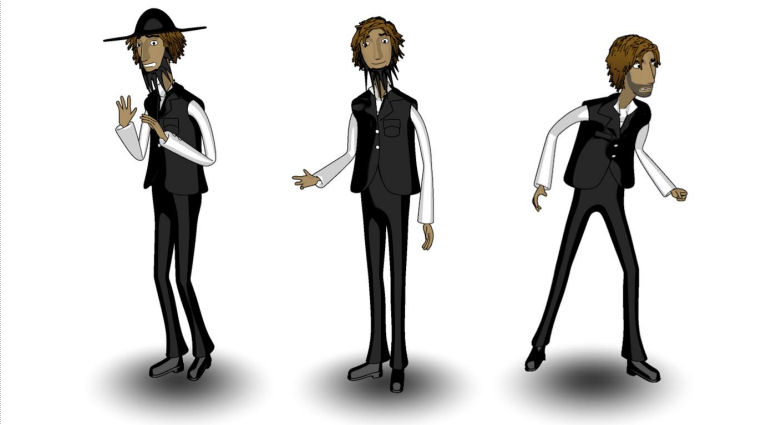
JA: What games inspired you in your creation of A Little Less Desperation?
MC: It was games and movies. The very obvious games are the old Lucas Arts games, like Monkey Island 1 + 2 + 3, Day of the Tentacle, Indiana Jones and the Fate of Atlantis, Sam & Max and Grim Fandango. Also, the Broken Sword adventures must not be forgotten. What all of these games have in common is their rather clear red line and a solid story creating a convincing world of their own, along with a cheeky humor without being really offensive or denouncing. I also took a lot of inspiration from Space Quest, I liked the permanent tension these games managed to build up, and of course, the space theme. Also VERY important: All those games (and many others I forgot to mention here) had puzzles that were directly connected to their story. Every puzzle solved told another bit of the story. I don’t like adventures that are more-or-less a story interrupted by sliding puzzles, that’s not really narrative.
There are also many movies, TV shows, directors and authors who influenced me and we have many references to them in our game! Just let me mention a few important ones: Terry Pratchett, Douglas Adams, Star Trek, Star Wars, Galaxy Quest, The Addams Family, Sledge Hammer, Tim Burton, Jean-Pierre Jeunet and Marc Caro, Ethan and Joel Coen, Steve Oedekerk, Blake Edwards and many more. I especially love their power of imagination and their great humor.
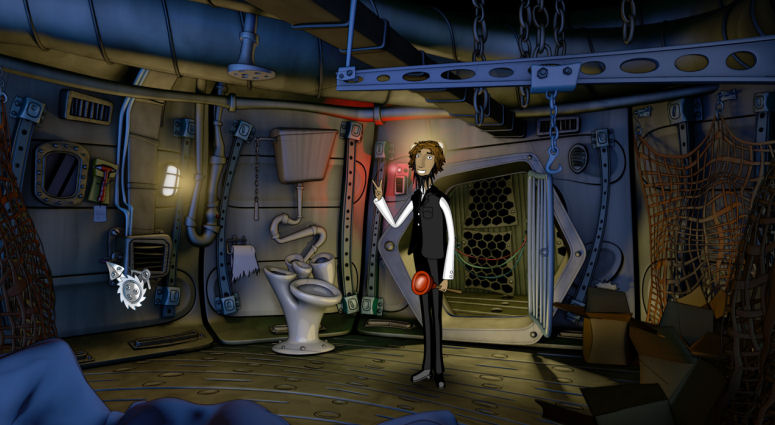
JA: From what I saw in the game’s demo, your game features several unconventional puzzles. How did you come up with your puzzle ideas? Do you have a favorite puzzle?
MC: There are three kinds of puzzles I don’t like. The number one “don’t” is sliding puzzles. They only take you away from the story, they completely destroy immersion. We put an unsolvable anti-sliding puzzle into our game as a statement, although we’ll need to make it clearer in the final game that it’s a joke only, since many people spent a long time to solve it anyway. [sic] The next kind I don’t like so much are the too obvious ones. Take key – use key in keyhole – voilà! If it’s just this kind of puzzle in an adventure, the game will become its own walkthrough and not challenging at all. [sic] For me that’s not satisfying, because you’ll be shorted from a very important aspect of adventure gaming: The great feeling of having solved a puzzle that required some thinking and deduction. The last kind I don’t like, or at least don’t like too much are the totally random puzzles you can’t solve by thinking and only by try and error. They can be fun sometimes, if they are down to a pun for example, but I prefer them to be rather limited.
What I like about the puzzles in our demo is that they can be solved by using logic and everyday experience. Some also are a bit teasing! For example we first gave the player the idea that it would be necessary to get access to the venting system and the large tubes to escape the cell, but it turned out to be a dead end. But at the second look, it wasn’t dead at all, because opening the venting system lead to an entirely different way to leaving the cell. [sic] I like those little twists and turns. First a success, then a bit of disappointment, followed by understanding, a new idea and finally a new success. I can’t really tell which puzzle in the game is my favorite. We have quite a few very nice ones that are not too straightforward. I quite like the one about the crowbar in Chapter 1. You need a crowbar to enter an abandoned and nailed up gold mine. And the only crowbar available at that point is inside its solid wooden shipping box that can only be opened, you guessed it, with a crowbar.
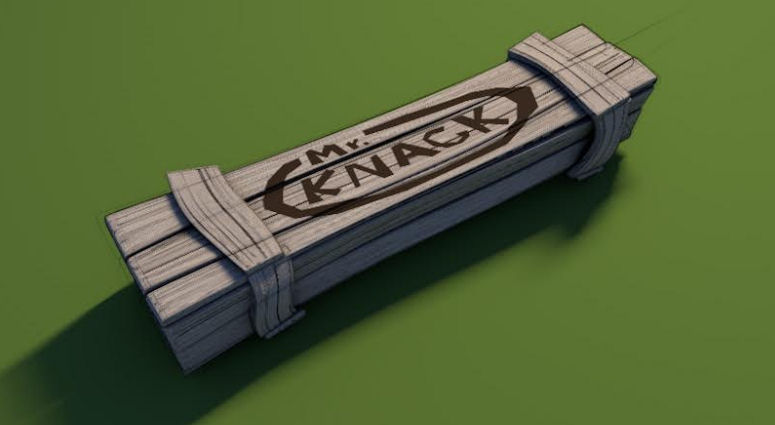
JA: What is the number one reason adventure gamers should donate to your campaign and get a copy of the game?
MC: I think we’re creating a really good piece of classic point-and-click adventure gaming for very little money. In fact, we didn’t calculate all the work we have done ourselves, it’s just what we’ll have to pay to others to get the game finished and we think that’s quite a good deal. Of course we hope to make a bit of money from the sales once the game is finished, but the main reason for us to make the game because this kind of game is part of the culture of my generation. [sic] I think every generation has an idea of its own what culture means. When I played those games as a teenager, my parents didn’t understand why I was doing it and thought it was nonsense, not really understanding what playing those games gave me. I guess my parents listened to records when they were young and their parents thought that was nonsense as well. Take our work and the support of our backers as a contribution help this kind of culture to survive. [sic]
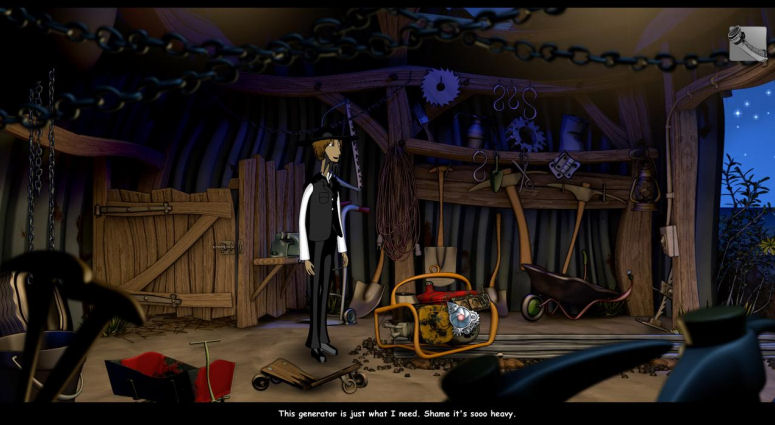
JA: Anything else you’d like us to know?
MC: Maybe an appeal or something to consider: When you play our game, try not to cheat, don’t look up a walkthrough. I think the internet is somewhat counterproductive when it comes to experiencing adventure games. Remember how it was earlier? If you got stuck, you had to either think harder and hope for a flash of wit or wait until the next day when you could meet the nerdy guy from your class to ask him. This generated this great sense of achievement. This got quite lost. So if you get stuck in our game, please lean back for a moment or maybe even switch it off until the next day, I’m sure you’ll get the right idea to solve the problem and feel what you felt as a youngster when you got past a puzzle.
Thanks to Marian for giving us a look into the process of creating this game! Again, you can donate to the Kickstarter at any plunger level here.
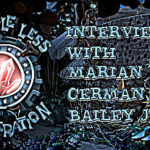
Leave a Reply